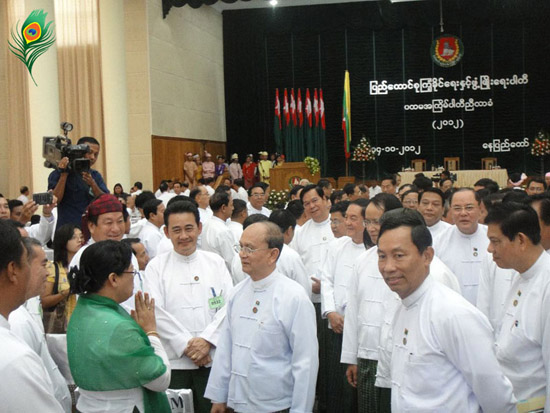Burma’s President Thein Sein was re-elected as chairman of the ruling state party but he named a fellow reformer Shwe Mann, the speaker of the Lower House of Parliament, to take over the day-to-day running of the party.
 Shwe Mann was re-elected one of the party’s three vice chairmen, along with Htay Oo, a former party general-secretary, and Aye Myint, the chairman of a parliamentary committee on sports, culture, and public relations development. The Union Solidarity and Development Party (USDP) held its annual conference attended by hundreds of party members in the capital Naypyidaw.
Shwe Mann was re-elected one of the party’s three vice chairmen, along with Htay Oo, a former party general-secretary, and Aye Myint, the chairman of a parliamentary committee on sports, culture, and public relations development. The Union Solidarity and Development Party (USDP) held its annual conference attended by hundreds of party members in the capital Naypyidaw.
The speaker is seen as a growing rival to the president, who has spearheaded the country’s reforms since taking the helm of government in March 2011 following decades of military rule.
The Voice of America reported on Wednesday that there had been talk the military-backed USPD might try to replace Thein Sein with his main rival, Lower House Speaker Shwe Mann.
Shwe Mann is considered to harbor ambitions for the presidency after the 2015 polls, and some USDP members had said before Tuesday’s executive committee vote that they expected him to be named party chairman.
“The conference is important as it will lay down guidance for the party for the 2015 election,” conference committee chairman Aung Thaung told Radio Free Asia (RFA).
In addition to electing party leaders on Tuesday, the USDP also reorganized the 44-member Central Executive Committee from among some 300 members of a larger panel.
The USDP won three quarters of the seats in parliament in the last general election in November 2010, which Aung San Suu Kyi’s National League for Democracy (NLD) boycotted.
In the April by-elections, the NLD won 43 out of 44 seats it contested, making it the largest opposition party in parliament.
Thein Sein has left open the possibility of serving another term in office after the 2015 elections.
“If I have my way, I will only serve one term,” said the 67-year-old retired general at a forum in New York last month. “But of course, the future of the position depends on the needs of the country and the wishes of the people,” he said.


